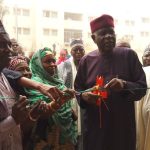The Federal Government says it will invest N12 billion in digital economy research projects to advance Nigeria’s digital transformation and strengthen the nation’s knowledge-based economy.
The Minister of Communications and Digital Economy, Dr. Bosun Tijani, disclosed this on Tuesday at the opening of the 18th International Conference on Theory and Practices of Electronic Governance (ICEGOV) in Abuja.
The conference, themed “Shaping the Future of Digital Governance Through Cooperation, Innovation and Inclusion,” was organised by the National Information Technology Development Agency (NITDA).
Tijani said the government’s participation in ICEGOV 2024 underscored its commitment to deepening research in the digital economy and fostering innovation through partnerships with local and international stakeholders.
“The Nigerian government is not doing this as a show. Immediately after ICEGOV last year, we funded over 55 research projects,” the minister said.
“At the moment, we are putting together about N12 billion to fund additional research projects focused on the digital economy. We are also establishing three research clusters across six universities—one dedicated to artificial intelligence, another to connectivity, and a third to digital skills and literacy,” he added.
According to him, digital technologies have become central to human existence and development, and societies that fail to embrace them risk being left behind.
He stressed that technology should not only be seen as an economic driver but as a tool for reshaping governance and societal progress.
In her remarks, the Chair of the ICEGOV Steering Committee, Prof. Elsa Estevez, called for stronger global cooperation to manage the opportunities and risks associated with artificial intelligence.
“We need to ensure that innovations are not only technological but also human-centred and contribute to better societies,” she said.
Estevez added that governments must secure the digital space against fake news and political manipulation through effective regulation, education, and public awareness anchored on information ethics.
Also speaking, the Director-General of NITDA, Malam Kashifu Inuwa, said the federal government would integrate digital literacy into the national school curriculum by 2026.
He said the initiative, developed in collaboration with the Ministry of Education, aimed to equip young Nigerians with digital skills that align with national development goals.
“In Africa, we have a very young and digitally native population. Governments must meet citizens where they are—online,” Inuwa said.
He added that the government was also implementing measures to ensure public servants acquire digital literacy skills to enhance service delivery.
In May, the minister announced that the National Digital Economy Bill—initially introduced in 2024—would return to the National Assembly for further legislative consideration.
The bill seeks to provide a comprehensive legal framework for Nigeria’s digital economy, covering electronic transactions, data protection, cybersecurity, and digital infrastructure development.
The initiative is expected to foster innovation and ensure inclusive participation in Nigeria’s ongoing digital transformation.






